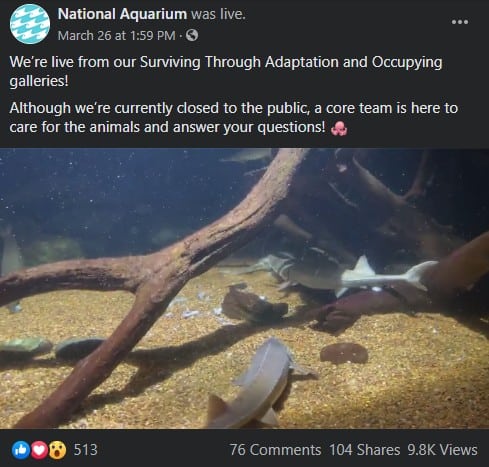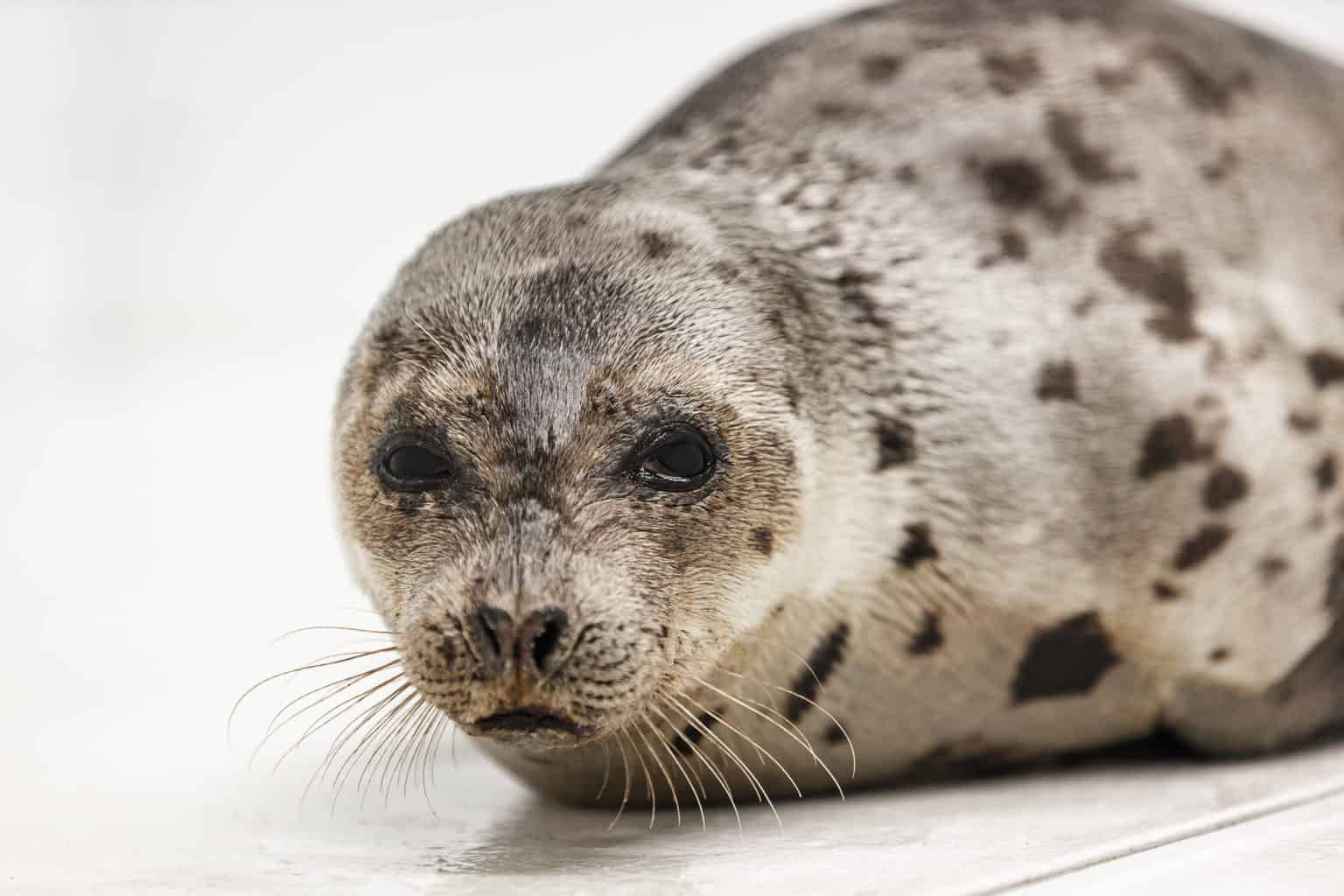With a reliable internet connection, children now learning at home can stay connected to their favorite aquariums and museums from Hampton Roads to Baltimore.
Here’s a roundup of some of the virtual learning experiences throughout the Bay region, which educators and staff have worked tirelessly to create in short order.
Chesapeake Bay Foundation
CBF’s mission has always been to “Save the Bay” through action and education. Now that it’s not so easy to get out and act, the Foundation is amping up its virtual experiences.
“We’re aiming to go beyond just virtual learning as well by providing schools and other education institutions with content that ties directly into their curriculum (as we have traditionally provided with our on-the-water field experiences for students),” says CBF’s AJ Metcalf.
The Foundation’s new “Learn Outside, Learn at Home” program will feature updated videos, activities, and lessons exploring life and conservation practices throughout the watershed. Children can learn how to plant a rain garden, construct a rain barrel, and check out a smartphone water quality app. Educator-led videos and assignments and other activities will hit the CBF website soon.
National Aquarium
The National Aquarium in Baltimore was already live-streaming its aquatic life. Now, Public Relations Manager Jennifer Reardon says the aquarium is expanding its virtual experiences.
“Since the closure, we have had a great increase in viewership of our live streaming cameras on our website. We currently have three live stream cams which stream three separate exhibits: Blacktip Reef, Pacific Coral Reef and Jellies Invasion.”
Reardon adds that the aquarium has also launched a brand-new webpage called “At-Home Activities,” which offers a variety of ocean-themed opportunities for kids including coloring pages and word searches. The institution encourages visitors to keep checking its social media account on Facebook, Twitter, Instagram, and YouTube for increased live and interactive content.
The Mariners’ Museum & Park
Newport News’s maritime history museum welcomes virtual visitors of all ages with online offerings:
-Four blogs per week on the historical importance, intrigue, and innovation of the museum’s expansive collection.
-“Creative Connection,” a Facebook and Twitter series offering school-aged children the chance to take on “maritime-inspired challenges,” based on the museum’s artifacts or special objects.
-The “Age of Exploration” website for an inside look at the maps, navigational instruments, and ships explorers used during their journeys. Museum spokesperson Jenna Dill says “this is a GREAT resource for all homeschool parents…Educators from all over the world use this site on a daily basis!”
Virginia Living Museum
“Education soars at the Virginia Living Museum with new Natural Education – virtual learning programs that keep Virginia residents of all ages engaged and informed!” the museum proclaims.
The VLM’s educators, animal welfare staff, and conservationists are streaming live animal feedings and offering lessons and challenges on social media.
In addition to the museum’s live feedings, its “Diet of the Day” talks about what animals like to eat, and VLM experts highlight different species during “Awesome Animal Ambassadors”
-“Nature at Noon” encourages kids to get out into their own backyards and find specific items, while “Living Green Sustainably” focuses on the things families can do to protect their part of the watershed. At the end of the day, virtual visitors can even learn about the stars and listen to a bedtime story.
Nauticus
Norfolk’s maritime science center has introduced its first annual “Deep Sea Trash Creature Contest,” a challenge sure to keep kids engaged while at home. Using recyclable materials and other household items, contest entrants will create a deep sea creature after researching a specific species and its adaptations.
“With schools closed, our goal is to support families trying to provide that educational content at home,” says Nauticus’s Executive Director Stephen E. Kirkland. “This contest is not only incredibly fun, it also gives families a chance to learn about marine biology, design and engineering principles, and the importance of recycling.”
Nauticus says winners will be selected every two weeks, and prizes include take-out dinner from a local restaurant, Amazon-delivered board games, and a special prize package that includes gift certificates and a Nauticus membership.
The museum will also hold maritime-themed Facebook live Virtual Adventures each day of the week.
Virginia Aquarium & Science Center
As anyone who’s ever visited the Virginia Aquarium & Science Center can tell you, there’s nothing quite like being able to watch a child enjoy a touch-tank or marvel at giant fish swimming by. Until the aquarium is able to once again welcome guests, it’s working hard to offer kids experiences at home.
From “Animal Adaptations” to live videos and scavenger hunts, “Animal Bingo” to word searches and sea turtle education, the aquarium will continuously update its website with engaging activities to keep kid’s minds busy while teaching them more about some of their favorite Chesapeake-area species.
Science Museum of Virginia
The museum’s Jennifer Guild says that although much of the institution’s experiences are hands-on, it now has a chance to teach in a new way. “We have a unique challenge, but that also provides us a lot of opportunity. As soon as we realized that this was something where we’d have to close our doors, we really ramped up the opportunity that we had to pull the knowledge that exists inside their brains and share it with the rest of the world.”
Climate scientists, biology educators, and astronomers are keeping viewers connected to big science concepts. The science museum’s YouTube channel has always been a great resource, and the museum has always encouraged people to find the science in their own homes or backyards.
“Our job is to connect people to the science that’s already around them,” Guild says. “You don’t need to necessarily go out and look for these elaborate science experiences. You can look around you and see the things in your backyard that are science. Look through your pantry or cleaning supplies…think about how many chemical elements that are just there.”
The Nature Conservancy
The Conservancy reports that it has launched Nature Lab, an online learning platform about the science that drives nature.
Director of Youth Engagement Programs Kate Ireland says she’s proud the Nature Conservancy can keep kids connected to nature during this challenging time, “offering families some support and opening up new worlds for young people.”
Nature Lab includes courses for students from Kindergarten through 12th Grade, videos and virtual field trips that explore topics like coral reefs and the rainforest.
While our opportunities to get out in the Bay region are limited, learning about it is well within reach. The Mariners Museum’s Jenna Dill expresses the sentiment most of these organizations probably feel:
“Even though we can’t physically be with our guests, we know that our hearts are united as one. We are connected together as a community, not only by the world’s waters and the stories we share.”
–Laura Adams Boycourt




